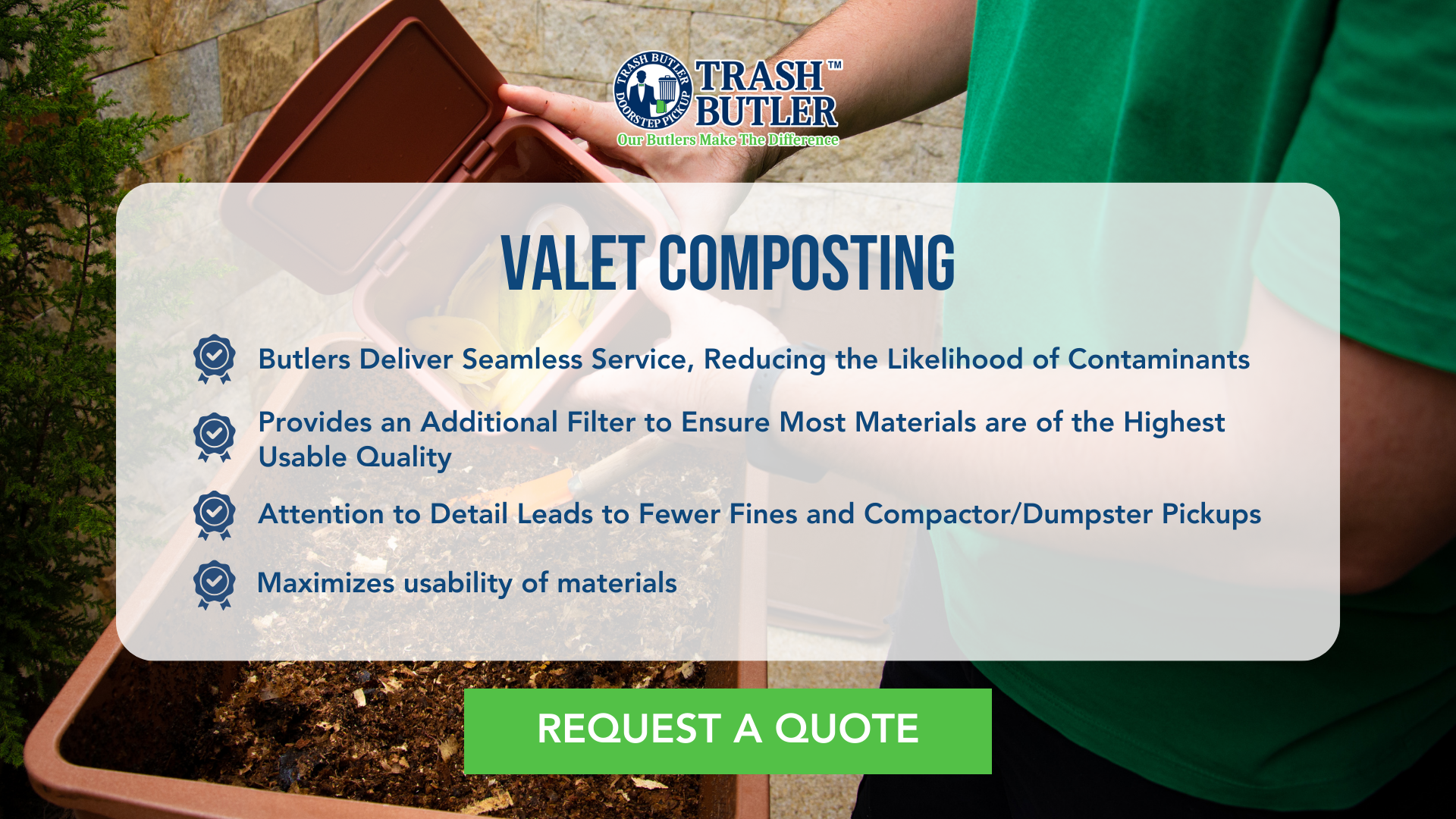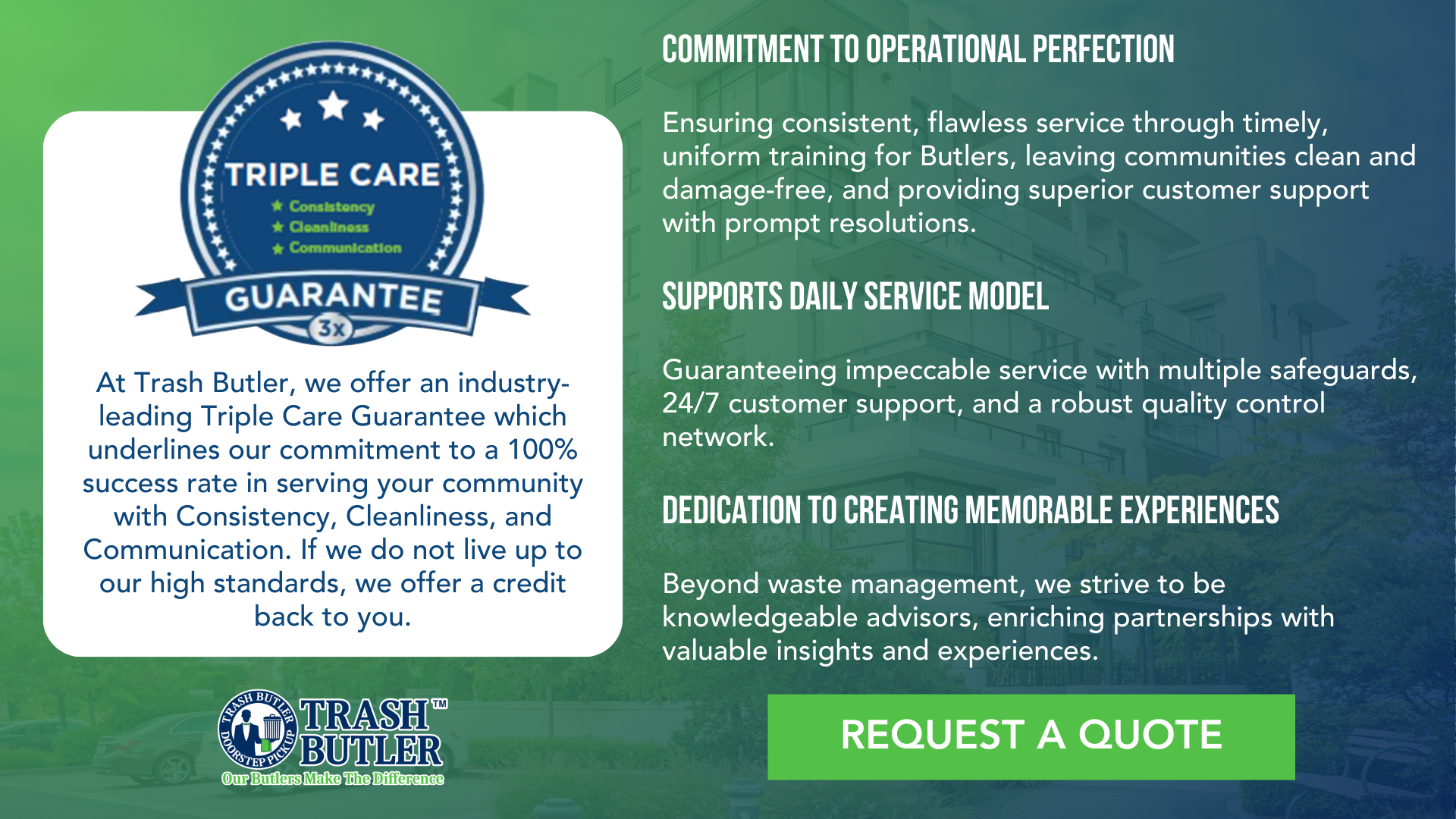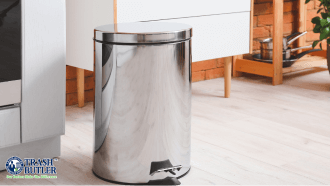Are you a resident or property manager in a multi-family apartment community in Seattle eager to embrace environmentally friendly practices? Composting is a fantastic way to reduce waste, minimize environmental impact, and improve soil quality for healthier plants and gardens. However, traditional composting methods can be challenging for apartment dwellers.
Fortunately, convenient solutions are now available to make composting in Seattle apartment complexes easier than ever. By adopting composting practices, you can contribute to a more sustainable future while enjoying the benefits of enriched soil and thriving plant life.
Ready to revolutionize your apartment complex’s sustainability efforts? Introducing Trash Butler™ – your expert doorstep valet trash service and recycling solution! Composting in your Seattle community has never been simpler. With a mission to make sustainable living practical for urban dwellers, Trash Butler™ offers tailored composting solutions.
Trusted by over 275,000 units nationwide, we are dedicated to reducing waste, promoting effective recycling, and seamlessly integrating composting into your daily routine. Join the movement towards greener living today.

Composting for apartments in Seattle involves decomposing organic waste into nutrient-rich soil amendments within the confines of limited living spaces. This eco-friendly practice helps reduce landfill waste, enrich soil health, and promote sustainable urban living.
Whether in a high-rise downtown or a cozy apartment complex, composting offers a practical solution to minimize environmental impact while maximizing resource efficiency.
For residents of apartment buildings in Seattle, composting may seem daunting at first, especially when space is limited, and there are no backyard gardens to deposit organic waste. However, with the right knowledge and resources, composting in apartments can be simple and rewarding.
Composting is considered essential for apartments in Seattle, a city that prioritizes green living and reducing waste. Here are a few reasons why:
Composting is fantastic because it reduces the amount of organic waste in landfills. When we compost food scraps and other organic stuff in Seattle apartments, we do our part to shrink our carbon footprint and keep methane emissions, which mess up the environment, in check. Plus, it helps us achieve the city’s goal of reducing waste to make our environment cleaner and healthier.
Seattle is pursuing ambitious goals to transform into a zero-waste metropolis, striving to diminish waste while boosting recycling and composting rates. By introducing composting initiatives in apartment complexes, inhabitants can play an active role in realizing the city’s waste reduction objectives. This endeavor contributes to environmental preservation and propels Seattle forward in its journey toward zero-waste excellence.
Composting programs in apartments foster a sense of community and environmental stewardship among residents. Encouraging participation in composting initiatives allows neighbors to come together, learn about sustainability practices, and work towards reducing waste. It creates a shared commitment to environmental responsibility within multi-family apartment communities.
Implementing composting programs in apartment communities can also serve as an educational platform. Residents can learn about the benefits of composting, proper techniques for managing organic waste, and the importance of environmental stewardship.
Compost isn’t just trash—it’s gold for soil and plants! If you’re living in an apartment in Seattle, you can turn your kitchen scraps and organic waste into nourishing compost. This stuff isn’t just good for the environment; it also benefits your community! Imagine all the beautiful community gardens and lush landscaping you could help thrive by pitching in with composting. Plus, it’s not just about the outdoors; you can use compost to boost the health of your indoor plants as well.
If you’re keen on reducing waste and contributing to a greener environment, composting in your Seattle apartment is an excellent place to start. Here are some practical steps to help you kickstart your composting journey right from the comfort of your own home:
Select a small, odor-proof composting bin that fits well in your apartment space. Look for a bin with a secure lid to prevent any unwanted smells or pests.
Knowing what can and cannot be composted is crucial. Typical compostable items include fruit and vegetable scraps, coffee grounds, eggshells, and non-greasy food waste. Avoid composting dairy, meat, bones, and oily foods.
Begin by placing a layer of brown materials like dried leaves or shredded paper at the bottom of your bin. Then, add a layer of green materials, such as fruit and vegetable scraps. Repeat this layering process and ensure your compost is moist but not overly wet.
Mix the contents of your compost bin regularly to help with aeration and decomposition. Monitor the moisture levels and adjust as needed. Add brown materials if the compost appears too wet or green materials if it seems too dry.
Once your compost is ready, you can use it to enrich your houseplants and garden or even donate it to local community gardens. Composting not only reduces waste but also provides nutrient-rich soil for your plants.
Follow the above easy steps, and you can incorporate composting into your daily routine, even if you’re living it up in your Seattle apartment. It’s a great way to do your part for the environment from your sweet home.
For residents of multi-family apartment communities in Seattle, here are some of the best composting methods to consider:
Indoor composting bins are a convenient option for residents with limited outdoor space. These bins come in various sizes and styles to fit different kitchen layouts. Look for a bin with a tight-sealing lid to prevent odors and pests. Materials like fruit and vegetable scraps, coffee grounds, and eggshells can help start composting.
Vermicomposting, or composting with worms, is another efficient method for apartment dwellers. A small worm bin can easily fit in a closet or under the sink. Red wriggler worms feed on organic waste and produce nutrient-rich castings that can be used as plant fertilizer. This method is odorless and can be done year-round.
Some neighborhoods in Seattle offer community composting programs where residents can drop off their food scraps at designated locations. These programs often turn the collected waste into compost that can be used in local gardens and parks. Check with your apartment community or local government to see if community composting is available.
Composting in small Seattle spaces, such as apartments or compact urban dwellings, presents unique challenges. However, with creative solutions and careful management, these obstacles can be overcome to implement composting practices successfully:
When composting in your Seattle apartment, selecting the right composting bin is key to successfully managing your organic waste. Here are some factors to consider when choosing a composting bin that fits your apartment lifestyle:
Seattle prioritizes sustainability and green initiatives, including composting, particularly for apartment residents. The city offers various resources and programs to support composting in apartment communities.
The Food and Yard Waste program is a key initiative, enabling residents to separate food scraps, food-soiled paper, and yard waste for collection, thereby diverting organic waste from landfills.
For your convenience, a variety of educational resources and workshops are readily available. These resources are designed to help you understand the benefits of composting and effectively manage your organic waste. This is particularly beneficial for apartment dwellers who may have limited space or experience in composting.
Partnering with trusted valet trash and recycling services like Trash Butler™ can streamline the process for apartment communities looking to implement composting programs. Trash Butler™ offers tailored solutions for multi-family properties, including composting services, to help residents easily participate in composting while maintaining a clean and sustainable living environment.

Composting in Seattle apartments is feasible and crucial for achieving the city’s zero-waste goals and promoting sustainable urban living. Despite the challenges of limited space and other factors, residents can overcome these obstacles with innovative solutions and community support.
By embracing composting practices, apartment dwellers play a vital role in reducing landfill waste, minimizing greenhouse gas emissions, and nourishing the local ecosystem with nutrient-rich soil.
Together, we can create a more environmentally conscious and resilient city where every resident contributes to a greener future.
Looking to streamline waste management in your Seattle apartment complex? Trash Butler™ offers convenient composting services tailored to urban living. Our team handles all aspects of compost collection and management so you can enjoy the benefits of sustainable living without the hassle.
To learn more about how Trash Butler can streamline your composting process and request a quote, please contact us today. Let’s work together to make composting easy and effective for your apartment in Seattle!
Yes, Seattle offers community composting programs and drop-off locations where apartment residents can bring their compostable materials for proper disposal.
Seattle is proactive about waste reduction and composting; however, it’s always best to check with your building management and the city’s waste management policies. Preventing odors and pests starts with the correct balance of compost materials, ensuring you do not add meat or dairy products (unless using a Bokashi system), and keeping the compost adequately aerated. Small indoor composters designed for apartments often come with filters and tightly sealed lids to help control odors and deter pests.
Preventing odors and pests starts with the correct balance of compost materials, ensuring you do not add meat or dairy products (unless using a Bokashi system), and keeping the compost adequately aerated. Small indoor composters designed for apartments often come with filters and tightly sealed lids to help control odors and deter pests.
Yes. Compost produced in your apartment can be a fantastic amendment for indoor or community garden soils, enriching the soil and providing plant nutrients. If you don’t have your garden, you can often donate compost to local community gardens or friends who garden.
Many indoor composting solutions are designed exactly for those without outdoor space. Vermicomposting and electric composters, for example, can comfortably fit into a small corner or under a kitchen sink.
Finished compost can be used in houseplants, donated to community gardens, or sometimes even included in your building’s landscaping efforts. Some local services also accept finished compost.
Common composting problems include odors, pests, and improper decomposition. These can usually be resolved by adjusting moisture levels, ensuring proper aeration, and balancing “greens” and “browns” in your compost mix.
Hot composting involves managing the pile to increase its temperature, speeding up decomposition. Cold composting is less management-intensive but takes longer. Due to space and equipment constraints, most Seattle apartment composters will find cold composting methods like vermicomposting more practical.
In traditional composting, meat and dairy are avoided to prevent odors and pests. However, a Bokashi composting system is designed to handle these materials safely.
Minimizing food waste involves planning meals, storing food properly to extend its shelf life, and getting creative with leftovers. By reducing the amount of food waste generated, you’ll also reduce the need for composting.

Why Valet Trash Services Are Essential For Orlando Apartments
Discover why valet trash for apartments in Orlando is essential. Enhance resident satisfaction and property value with top-notch valet trash…

Why Valet Trash Services Are Essential For Orlando Apartments
Discover why valet trash for apartments in Orlando is essential. Enhance resident satisfaction and property value with top-notch valet trash…

Everything Property Managers Need To Know About Doorstep Trash Pickup
Essential guide for property managers on doorstep trash pickup for apartments. Improve tenant satisfaction and streamline operations with…